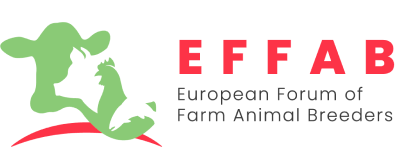Why
Code efabar
Animal Breeding has strongly and positively evolved over the last two decades to face environmental and societal challenges; however, Animal Breeders don’t have a long tradition of communicating about breeding practices.
The Code EFABAR Initiative started in 2005 to showcase the commitments of EFFAB members toward more sustainable breeding and farming. Code EFABAR is the common tool of the sector to engage in dialogue with policymakers, stakeholders, and civil society about modern and balanced animal breeding programs in which animal health and welfare, and traits related to sustainability, have become increasingly important.
As a commitment to responsible and balanced breeding, EFFAB members adopt Code EFABAR, the code of good practices for animal breeding. The code is based on 6 pillars from animal health and welfare to food safety and recognises the central role of sustainability in safeguarding food security.
Our members on
Code EFABAR
When asked, “Why is Code EFABAR important?” Our members reiterate the fact that not only does it help them to assess the sustainability of their breeding programs and activities, but it also shows their stands on animal health, welfare and the importance of transparency. It creates a path for discussion within the company but also with policymakers, stakeholders and customers on sustainability and the future breeding goals.
Johan van Arendonk, Hendrix Genetics
Hans Olijslagers, Topigs Norsvin
“AquaGen exports fish to a global market we must meet with some quality standards; these standards mainly focus on management, fish welfare, chemicals or workers safety. However, none of these standards focus on what AquaGen does, namely selective breeding. To comply with quality standards on selective breeding, the Code EFABAR has been adopted. It helps AquaGen to communicate in a transparent way about topics such as genetic diversity, breeding programs, genetic technologies and so on. Code-EFABAR shows that AquaGen is involved in responsible sustainable breeding; resulting in good results on the short term but also on delivering genetic diversity for the next generations to come”.
Sven Arild Korsvoll, AquaGen



